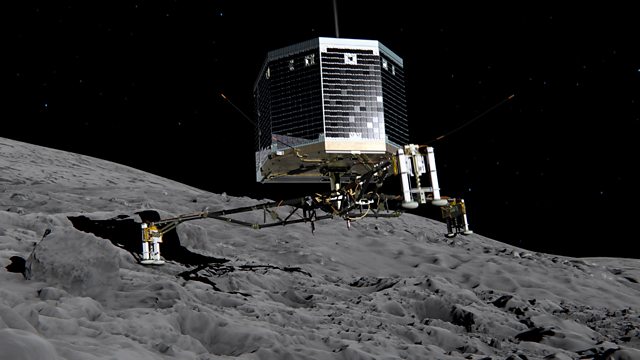Early Results from Philae
Philae's instrument detect organic materials on Comet 67P, Future plans for NASA, Global agricultural emissions, Sending data with twisted light, African Engineering Prize.
Rosetta’s first success was getting its lander probe Philae to the surface of Comet 67P, granted with a few bumps on the way. Now, instruments on-board Philae have managed to send back data about its new home to the scientists at the European Space Agency. This week, the COSAC instrument has detected organic materials on the comet’s surface – Monica Grady, Professor of Planetary Science from the Open University in the UK talks to Science in Action about what studying these compounds may tell us about how life began on Earth.
Nasa Plans for Mars
Dr David Miller is Nasa’s chief technologist. He tells Science in Action about the American Space Agency’s future ambitions in space, including plans for manned missions to Mars and the challenges that such a trip poses, as well as the use of commercial agencies to help Nasa get there.
Agricultural Emissions
Growing and harvesting both crops and livestock are greenhouse gas intensive, emitting large amounts of not only carbon dioxide but also methane and nitrous oxides. These perhaps hidden emissions are now getting more international attention, particularly as global trade in agriculture means that emissions are hard to assign – is it the country that produced or consumed the beef, chicken or pork that has to account for it? A new study has just analysed the production and conveyance of these emissions. Pierre Gerber, senior policy officer at the UN’s Food and Agriculture Organisation, and Dr David Styles from the School of Environment, Natural Resources and Geography at the University of Bangor, discuss the importance of understanding how these greenhouse gas emissions are moved between countries through agricultural trade.
Twisted Light
Researchers in Austria have sent twisted beams of light 3km across the rooftops of Vienna. It is the first time that twisted light has been transmitted over a large distance outdoors and the scientists were able to show that the data it carried was unaffected by air turbulence. Mario Krenn is a PhD student at the University of Vienna’s Institute for Quantum Optics and Quantum Information. Leading this research, he explains how his team tested the ability of twisted light to transmit real information and how its vast carrying capacity could be exploited in future quantum and traditional communication systems.
African Engineering Prize
This is the first year of the Royal Academy of Engineering’s Africa Prize for Engineering Innovation. It is Africa’s biggest prize devoted to engineering innovation, covering all disciplines from mechanical and civil to biomedical, oil and gas. There are 12 African innovators who have been selected by the Royal Academy of Engineering to receive training and mentoring to help get their businesses off the ground. One of the shortlisted candidates is Samuel Malinga, a sanitation engineer at Makerere University in Uganda – he explains what innovations he has developed to improve sanitation systems in his region.
(Photo caption: European Space Agency’s Rosetta probe Philae lands on the comet 67P © ESA/ATG medialab)
Last on
More episodes
Previous
Chapters
-
Early Results from Philae
Rosetta's lander probe detects organic materials on the surface of Comet 67P
Duration: 05:50
NASA plans for Mars
NASA Chief Technologist, Dr David Miller, on the space agency’s ambitions for Mars
Duration: 05:11
Agricultural Emissions
New research looks at the global trade of greenhouse gas emissions from agriculture
Duration: 07:10
Twisted Light
Scientists send real data over the rooftops of Vienna using twisted light
Duration: 04:40
African Engineering Prize
The UK’s Royal Academy of Engineering African Prize for Engineering Innovation
Duration: 02:38
Broadcasts
- Thu 20 Nov 2014 19:32GMT91�ȱ� World Service Online
- Fri 21 Nov 2014 00:32GMT91�ȱ� World Service Online
- Fri 21 Nov 2014 04:32GMT91�ȱ� World Service Online
- Fri 21 Nov 2014 13:32GMT91�ȱ� World Service Online
Podcast
-
![]()
Science In Action
The 91�ȱ� brings you all the week's science news.


